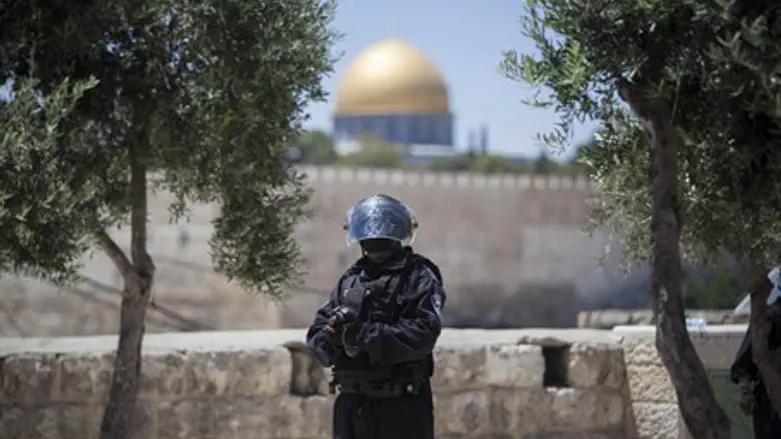
International leaders have called on Israel to continue a ban on Jewish worship on the Temple Mount, Judaism's holiest site, in order to maintain calm and placate Muslim extremists who have been rioting for three days straight in Jerusalem.
UN coordinator Nickolay Mladenov warned during a Security Council meeting Tuesday that clashes between Palestinian rioters and Israeli security forces could provoke violence by Muslims elsewhere in the Middle East.
"As the Middle East faces a vicious tide of terror and extremism, such serious provocations have the potential to ignite violence well beyond the walls of the Old City of Jerusalem," Mladenov said.
The envoy called for "restraint" and said it was "imperative that the historic status quo is preserved" - namely allowing limited access to Jews to visit, but not pray, at the site.
On Tuesday, clashes at the site spread to Jerusalem's Old City, including an attack by Palestinian terrorists which killed an Israel motorist.
The site of two Jewish temples, the Temple Mount today houses a sprawling Islamic complex built on their ruins, known to Muslims as "Al-Aqsa." Under Israel's peace treaty with Jordan, the Jordanian-run Waqf Islamic trust administers the site, and only Muslims are allowed to conduct any forms of worship.
Jewish groups have been challenging the restrictions to Jewish access in particular in recent years - which also include limits on the numbers of Jews who can visit each day, at certain hours only.
Despite a growing campaign of incitement and harassment by Islamist groups, the numbers of Jews visiting have grown steadily.
Palestinian and other Muslim groups say Israel is planning to change the "status-quo" on the site to allow Jewish prayers - although Israeli Prime Minister Binyamin Netanyahu has denied any such plans.
The Palestinian Authority envoy to the United Nations, Riyad Mansour, described the situation as "extremely dangerous" and accused "extremists on the Israeli side" of seeking to "impose a Jewish presence" at the site.
Mansour warned that such a move would lead to a religious confrontation that would have "ramifications in all corners of the Middle East and beyond."
"Religious confrontation is what ISIS is dreaming of," he told journalists, referring to the Islamic State jihadist group.
Meanwhile, United States on Monday condemned "all acts of violence" at on the Temple Mount - and urged the Israeli government not to lift restrictions on Jewish visits.
"The United States is deeply concerned by the recent violence and escalating tensions surrounding the Haram al-Sharif Temple Mount. We strongly condemn all acts of violence," State Department spokesman John Kirby said, calling on all sides to exercise restraint.
Israeli security forces entered the compound early on Monday - the first fay of the Jewish new year, Rosh Hashanah - to prevent Muslim extremists from harassing visiting Jews.
Booms could be heard outside the gates to the hillside complex, and police said masked youths threw rocks at them as they entered Islam's third holiest site.
"It is absolutely critical that all sides exercise restraint, refrain from provocative actions and rhetoric and preserve unchanged the historic status quo on the Haram al-Sharif Temple Mount, in word and in practice," Kirby said.
Jordan's king also warned Israel on Monday that any further "provocation" in Jerusalem would damage ties between the two countries.
"Any more provocation in Jerusalem will affect the relationship between Jordan and Israel" which have a 1994 peace accord, said King Abdullah II on Monday.
"Jordan will not have a choice but to take actions, unfortunately," he told journalists in English after talks with visiting British Prime Minister David Cameron.
The latest flare-up came amid little sign of momentum in the Israeli-Palestinian peace process, which has been comatose since a failed US diplomatic effort in April last year.
The United Nations is holding a meeting of the Middle East Quartet seeking a diplomatic solution to the conflict on September 30, on the sidelines of the General Assembly session. .